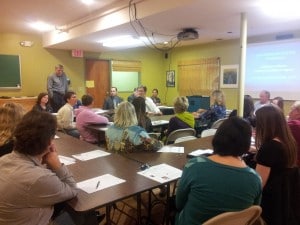“Cultural Humility: People, Principles and Practices,” is a 30-minute documentary by San Francisco State professor Vivian Chávez, that mixes poetry with music, interviews, archival footage, and images of community, nature and dance to explain what Cultural Humility is and why we need it. The film describes a set of principles that guide the thinking, behavior and actions of individuals and institutions to positively affect interpersonal relationships as well as systems change. These principles are:
• Lifelong learning and critical self-reflection
• Recognizing and changing power imbalances
• Developing institutional accountability
More than a concept, Cultural Humility is a process of communal reflection to analyze the root causes of suffering and create a broader, more inclusive view of the world. Originally developed by Doctors Melanie Tervalon and Jann Murray-Garcia (1998) to address health disparities and institutional inequities in medicine, Cultural Humility is now used in public health, social work, education, and non-profit management. It is a daily practice for people who deal with hierarchical relationships, changing organizational policy and building relationships based on trust.
The film tells stories of successes and challenges, and the road in between for those working to develop partnerships among community members, practitioners and academics. It encourages us to realize our power, privilege and prejudices, and be willing to accept that acquired education and credentials alone are insufficient to address social inequality. The first segment introduces Cultural Humility and features interviews with Melanie Tervalon and Jann Murray-Garcia. The second clip offers the context and setting, poetry readings by San Francisco State public health students and an analysis of privilege and power. The third segment is about Community Based Participatory Research and Education; it features the work of the Chinese Progressive Association academic partners and critical educators/students. The last segment brings closure with a reflection on peace, embodied images of nature and a quote by Audre Lorde.
Audiences who might find this documentary helpful include professionals, students, providers, organizers and policy makers in public health, social work, medicine, psychology, nursing, education and more.
M. Tervalon, J. Murray-Garcia (1998). Cultural humility versus cultural competence: a critical distinction in defining physician training outcomes in multicultural education, Journal of health care for the poor and underserved, Vol. 9, No. 2. (May 1998), pp. 117-125.
Vivian Chavez © 2012, Creative Commons license: Attribution-NonCommercial-NoDerivs 3.0 Unported (CC BY-NC-ND 3.0) http://creativecommons.org/licenses/by-ncnd/3.0/http://creativecommons.org/li…
 A very well-attended event (around 40 participants) and a great presentation by Don Thomas-Kremmer on the topic of mental health in the workplace, and the role of Employee Assistance Program. As usual, our participants engaged in interesting conversations, exchanged views, opinions and resources. We would like to thank our presenter, our participants and everyone who made this event happen! We would also like to thank those of you who provided us with valuable feedback that helps the Diversity Council improve the quality of our events.
A very well-attended event (around 40 participants) and a great presentation by Don Thomas-Kremmer on the topic of mental health in the workplace, and the role of Employee Assistance Program. As usual, our participants engaged in interesting conversations, exchanged views, opinions and resources. We would like to thank our presenter, our participants and everyone who made this event happen! We would also like to thank those of you who provided us with valuable feedback that helps the Diversity Council improve the quality of our events.
Don’s powerpoint presentation can be downloaded here.
A very interesting and compelling video showing the change in demographics across the United States.
The Shift: Hispanics in America
Tuesday, June 5th at 2:00 p.m. EST.
“Diversity – Moving from Color to Cultural Inclusion”
Summary:
Most companies today understand the business case for a diverse workforce. Study after study shows that diversity positively influences company revenues and profits due to the buying power of minority groups, the explosion of creative thinking from different viewpoints, and significant growth in the minority labor pool. So, why do diversity and inclusion programs fail? The answer is simple – most organizations prepare themselves for diversity of color; however, they do not understand the true diversity in cultures. It’s time to explore the difference and understand what drives people to act the way they do and how organizations need to embrace these differences both today and in the future.
“Diversity management is the key to growth in today’s fiercely competitive global marketplace. No longer can America’s corporations hide behind their lack of cultural intelligence. Organizations that seek global market relevancy must embrace diversity – in how they think, act and innovate. Diversity can no longer just be about making the numbers, but rather how an organization treats its people authentically down to the roots of its business model. In today’s new workplace, diversity management is a time-sensitive business imperative.
To better understand this fast-changing terrain, I reached out to three notable diversity executives — pioneers within their respective industries – to share their insights and perspectives regarding the future of diversity and some of the new best practices that will allow diversity to play a more strategic role in cultivating sustainable business growth:
- Dr. Rohini Anand, Chief Diversity Officer, Sodexo
- Ron Glover, Chief Diversity Officer, IBM
- Kathy Hannan, National Managing Partner, Diversity & Corporate Responsibility, KPMG LLP”
Link to the rest of the article here.
“According to new research, IPO firms with male CEOs get the advantage with investors, compared to those with female CEOs. This news probably comes as no surprise, but the nuances revealed by the study point to a conclusion that should be concerning to anyone who works in a field characterized by the term “meritocracy.”
More and more research is showing that gender weighs heavily on the equation when it comes to jobs, promotions, paychecks, and – in the case of the study – how much investors are willing to pour into a business.
A working paper recently released by researchers from the University of Utah and Washington University in St. Louis suggests that female led IPO firms do worse than male ones. The study says, “Despite identical personal qualifications and firm financials, female Founder/CEOs were perceived as less capable than their male counterparts, and IPOs led by female Founder/CEOs were considered less attractive investments.”
What Does It Mean To Be An Inclusive Employer?
Listen to some of the largest employers in the UK about the importance of being an inclusive employer.
“inclusion delivers performance and innovation”
“it’s about being open minded, it’s about being aware of what talent is available”
“inclusion delivers an environment where people can authentically be themselves, come to work and deliver in a way that suits them, but also achieves the business goals”
“we want to create a culture that is engaging, enticing and exciting for all the people we bring into the company”
“we’ve brought people into the firm for their different skills, their values and creativity and the impact they’re going to have on the business. The last thing we want to do is to try and change them.”

© City of La Crosse, WI and its representatives (http://www.cityoflacrosse.org/)
I’m glad to report that our Lunch and Learn event yesterday was extremely successful. We had over 30 participants from various companies and organizations, mostly from the La Crosse area, but also as far as Winona, Minnesota!
Our guests, Joe Veenstra and Ellen Frantz from Johns, Flaherty & Collins answered questions from the audience about best interview practices. They also offered tips on creating an inclusive and non-discriminatory workplace. Our participants obviously appreciated the experience and gave our guests glowing evaluations.
We thank our guests and our participants and hope to see you at our next event in June!
We welcome any suggestions on topics and/or presenters – please email us your thoughts and feedback: violeta.iguchi@glaxdiversitycouncil.com
Wednesday, April 11
11:30-1:00 p.m.
Southside Community Center
1300 S. 6th St.
La Crosse, WI 54601
Interviewing for Inclusive and Respectful Workplaces: How do we ask the questions?
Our guests are: attorneys Joe Veenstra and Ellen Frantz from Johns, Flaherty & Collins
Booking on https://www.glaxdiversitycouncil.com/events/lunch-and-learn/
